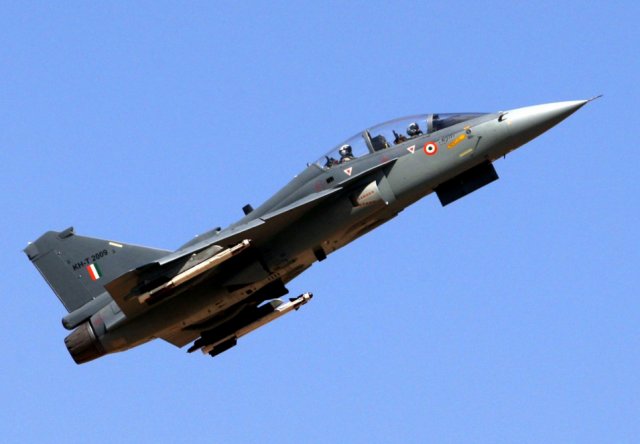Breaking news
Saab offers advanced sensor package for India's Tejas LCA Mk1A fighter jet.
| 2017
| a | |||
|
|
|||
|
World Defense & Security Industry News - Saab
|
|||
|
|
|||
|
Saab offers advanced sensor suite for India's Tejas LCA Mk1A fighter jet
|
|||
|
The Swedish defence and security company Saab offers a fighter sensor package for the Indian Tejas LCA Mk1A fighter aircraft, it announced today Feb. 15. The package consist of a state-of-the-art Saab AESA fighter radar closely integrated with a compact electronic warfare suite using Gallium Nitride based AESA technology.
|
|||
|
|
|||
 A IAF's Tejas LCA Mk1A fighter jet taking off during Aero India 2017 A IAF's Tejas LCA Mk1A fighter jet taking off during Aero India 2017(Credit: Ministry of Defence of India) |
|||
|
|
|||
|
Saab, in partnership with Indian industry, offers a solution that will bring the required Airborne Electronically Scanned Array (AESA) Fighter radar and Electronic warfare capability to India and the Indian Air Force. Thanks to our extensive technology development Saab can offer the latest technology, on time for the LCA Mk 1A needs, at low risk.
The AESA fighter radar is developed by Saab with antenna technology based on the latest technologies using Gallium Nitride (GaN) and Silicone Carbide (SiC) substrates in combination with the latest generation of exciter/receiver and processor technology, giving optimum installed performance in a dense signal environment. The radar has a complete mode suite which includes air-to-air, air-to-ground and air-to-sea capabilities. A built-in memory provides a tool to record a large amount of data from performed flights. Integration in the LCA Mk1A fighter aircraft is enabled by the limited space, power and cooling required. The EW suite consists of sensors and transmitters developed by Saab and is a highly capable and extremely compact solution that provides essential situational awareness and self-protection. The heart of the suite is an alectronic warfare receiver which is connected to a front end receiver and fin tip antennas inside the aircraft. Included is also an external AESA jammer pod. The radar warning system is based on ultra-wideband digital receivers and has very high probability of intercept, very good sensitivity and very high selectivity for handling the complex signal environment of today. The AESA jammer pod is small in size, low on weight and drag. Self-protection is based on Wideband Digital RF Memory (DRFM) that provides advanced jamming techniques and arbitrary combination of jamming waveforms. Transmission is performed by using GaN-based AESA:s. The EW suite also includes ground support systems and recording capability for advanced mission planning and post flight analysis. Saab’s solutions are based on the latest state-of-the-art technologies and COTS (commercial-off-the-shelf) available. The AESA fighter radar and electronic warfare units have no ITAR-restricted (Internationally Traffic in Arms Regulations) components, due to the high degree of Saab in-house developed and manufactured building blocks. Using contemporary technology provides the adaptability and growth potential needed to stay ahead. Technologies are re-used between variants and platforms in order to minimize Life Cycle Cost (LCC). “In our partnership, the transfer of technology will secure an indigenous Indian capability for series production, maintenance, repair and overhaul capability. Testing and development of the fighter sensor package will have synergies with the systems developed for Gripen,” says Anders Carp, head of Saab business area Surveillance. Saab has a proven background in tailoring systems to customer needs. This brings extensive experience from having open relations with customers when adapting advanced systems to new platforms. “Saab is a world leading company in the sensor area and has equipped some 4500 fighter aircraft with radar and electronic warfare systems. This has given us wide experience of successful sensor system integration, testing, and evaluation of radar and EW systems on fighter aircraft,” says Anders Carp. |
|||



















